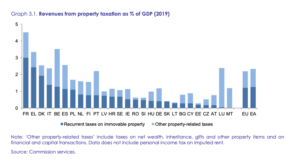A Social media user claims that “in Europe [EU] owners of apartments/houses of 78 square meters and above are taxed with (miraculously high) property taxes. The retirement age is also high, 67 for women, and 67-70 for men. Those obligations will also be passed on to us.” In reality, the retirement age and tax policy in the EU Member States are determined by the Member States themselves, not the EU institutions, therefore, in the case of EU membership, Georgia will not be obliged to increase the retirement age and property tax.

The European Union does not determine the property tax for member states, thus, different types of tax policies apply in the member states. In general, tax policy, including property tax determination, is the prerogative of individual member states. The EU only provides certain guidelines and recommendations to ensure the harmonization of the EU’s internal market, fair competition, and consistency of member states’ policies with the wider objectives of the EU. However, each member state sets its property tax systems based on its national priorities and fiscal policy.
According to Article 113 of the Treaty on the Functioning of the European Union, “The Council shall, acting unanimously in accordance with a special legislative procedure and after consulting the European Parliament and the Economic and Social Committee, adopt provisions for the harmonisation of legislation concerning turnover taxes, excise duties and other forms of indirect taxation to the extent that such harmonisation is necessary to ensure the establishment and the functioning of the internal market and to avoid distortion of competition”.
In the document prepared by the European Commission “Immovable Property Taxation for Sustainable and Inclusive Growth “, we read that “In most member states the final rate of at least one recurrent property tax is determined by the responsible municipality, which levies the tax and often also receives the revenues… The only member state where federal or central governments levy a majority of revenues (83.7%) is Greece”. The graph in the same document shows the percentage of the GDP of property tax revenues in EU member states. The mentioned indicator differs in different states because the each state determines its own tax policy.

As we can see, property tax revenues account for the largest share of GDP in France because property taxes are high, however, for example, in Malta, there is no recurring (annual or monthly) property tax at all, so property tax revenues represent the smallest percentage of GDP here.
Therefore, the claim that in case of joining the European Union, Georgia will be obliged to increase the property tax, is false.
Regarding the determination of the retirement age, each member state of the European Union has its pension system and determines the retirement age by taking into account various factors, such as the demographic situation, labor market conditions, social and economic policies, etc. The European Union may issue certain guidelines and recommendations so that pension systems in all member states are compatible with the principles and regulations of the European Union, as in the case of tax policy. Although issues related to pension policy and legislation are decided and implemented at the level of member states, EU legislation protects the retirement rights of people who move across EU countries, which is ensured by the coordination of social protection policies between member states. In addition, the EU supports the provision of a high level of social protection in member states, including the adequacy of pension systems, by promoting the exchange of best practices. To sum up, the specific details of pension policy, including the retirement age, are determined at the national level. Information about the pension system of each state is available on the website of the European Commission.
The data published by the Finnish Centre for Pensions presents in detail the retirement age determined in the EU Member States.








